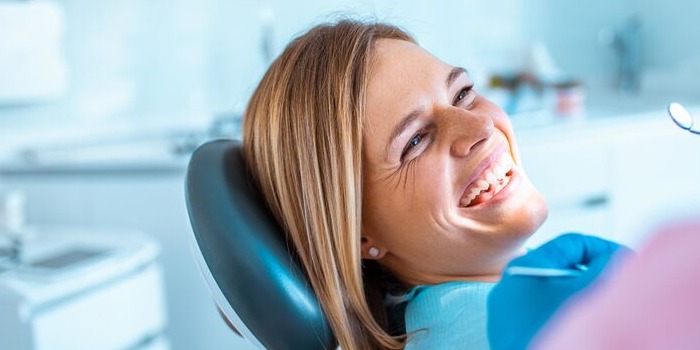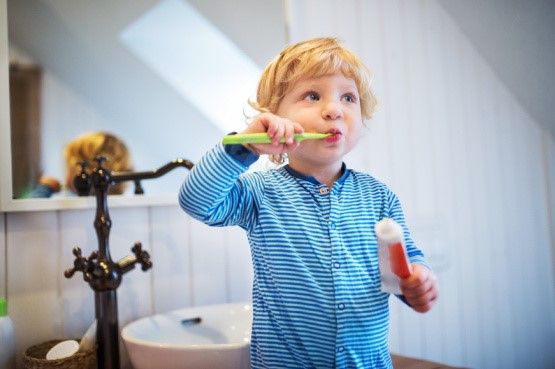What to expect when visiting the dentist
Whether it’s your very first visit or a routine check-up, visiting the dentist is an essential part of taking care of your health. Regular check-ups help your dentist find and treat problems early, and stop potential issues from developing. But it’s normal to feel nervous about going to the dentist, or put off going altogether. Knowing what to expect can help. So here I’ll explain exactly what happens at the dentist and share tips to ease your worries.

What happens when you go to the dentist?
Your dentist will tailor your appointment to suit your individual needs, which might include some or all of the following steps.
Step 1: Gather your medical history
Your dentist will start by getting a better picture of your current health. They’ll ask you some questions about your medical history and if you’re taking any medications that could affect your oral health or the treatment you can have. They’ll find out if you have any symptoms or problems with your mouth that you’re concerned about.
They’ll also ask you about lifestyle factors that can affect your mouth, such as your diet, alcohol intake, and whether or not you smoke. Finally, they might ask how you clean your teeth, such as the type of toothbrush you use, how often you brush, and if you floss.
Step 2: Examine your mouth
During your dental check-up procedure, your dentist will carry out a thorough examination of your mouth. This includes checking the health of your teeth, gums, cheeks, tongue, lips, and neck. They’ll look for any signs of tooth decay, gum disease, mouth cancer, and other potential problems. They might use a small metal instrument and a mirror to help them get a proper look.
Step 3: Take x-rays
Sometimes, your dentist might recommend you have a dental X-ray. This is so they can see what’s happening inside your teeth and gums. X-rays help your dentist get a clear view of any problems that can’t be seen with a visual examination alone. You can have a dental X-ray at your local dental practice and they only emit a very small, safe amount of radiation.
Step 4: Clean your teeth
If there’s a build-up of plaque on your teeth, your appointment may also include a professional cleaning, sometimes called a scale and polish. Your dentist might do this during your check-up or refer you to a dental hygienist for a separate appointment.
During the cleaning, your dentist will use special metal instruments to remove hardened plaque and stains from your teeth. Then, they’ll use an electric tool with a spinning head (similar to an electric toothbrush) to polish the surface of your teeth. This makes it harder for bacteria to stick and helps clean areas that brushing at home can’t always reach.
Step 5: Discuss your treatment plan
Your dentist will let you know if they find any problems during your examination and any next steps. If your dentist recommends further treatment – for example a filling, crown, or tooth removal – they’ll go through a treatment plan with you in detail. Your dentist will explain what type of treatment you need, what this involves, how many appointments you’ll need, and how much it will cost.
Step 6: Share teeth cleaning advice
Your dentist will also give you personalised advice to help you improve your oral hygiene at home. This could include things like tooth-bushing techniques, tips to reduce your sugar intake or support to quit smoking if you need it. This is also a great opportunity to ask any questions you may have about your dental care.
Step 7: Book your next appointment
Before you leave, your dentist will let you know when to schedule your next dentist appointment. If you need further treatment, they’ll ask you to book this in at reception. If your mouth is healthy, they’ll let you know how often they’d like to see you and when to book your next routine check-up.
Is it normal to feel nervous about going to the dentist?
Lots of people feel nervous about a dentist visit. In fact, it’ estimated that almost1 in 5 adults in England are afraid of visiting the dentist. There are also lots of possible reasons why you might be worried. Maybe you have a fear of needles, dislike the sound or smell of dental equipment, or had a bad experience in the past.
But there are lots of things you and your dental team can do before and during your appointment to make it more comfortable. Try some of the following.
- Contact your dental practice before your appointment to let them know you’re nervous. The team will have lots of experience with dental anxiety and do everything they can to put you at ease.
- Book your appointment for a time of day when you know you won’t be rushed and give yourself plenty of time to get there.
- Bring a calm and confident friend or family member with you for support.
- Have something to eat before your appointment, so you don’t feel dizzy or faint.
- Bring your headphones with you and pay some relaxing music throughout your appointment.
- Practice relaxation techniques like deep breathing or meditation, or distract your mind with a puzzle or task.
- Let your dentist know if you have a fear of needles. There may be other pain relief options they can use or ways to make you more comfortable.
- Ask your dentist if you’re a suitable candidate for sedation. This is when your dentist gives you a medicine that makes you feel drowsy and relaxed during your treatment.
- Remember you can ask your dentist to stop as often as you need to. Agree on a simple signal before – like raising your hand – to let your dentist know you need a break.
-
Sources Sources
- Your top 9 questions about going to the dentist – answered! American Dental Association. mouthhealthy.org, accessed March 2025
- Oral health promotion: general dental practice. NICE Guidance. nice.org.uk, published December 2015
- Dental exam. Medline. medlineplus.gov, last updated May 2023
- X-rays. Oral Health Foundation. dentalhealth.org, accessed March 2025
- Visiting a dental hygienist or dental therapist. Oral Health Foundation. dentalhealth.org, accessed March 2025
- Dental checks: intervals between oral health reviews. NICE Guidance. www.nice.org.uk, published October 2004
- Adult oral health survey 2021: service use and barriers to accessing care. Office for health Improvement & disparities. www.gov.uk, published January 2024
- Common dental fears. Dental Fear Central. www.dentalfearcentral.org, accessed March 2025
- My fear of the dentist. Oral Health Foundation. dentalhealth.org, accessed March 2025
- Relaxation and sedation. Oral Health Foundation. dentalhealth.org, accessed March 2025
- Personal communication, Anni Seaborne, Bupa Dentist, March 2025
About our health information
At Bupa we produce a wealth of free health information for you and your family. This is because we believe that trustworthy information is essential in helping you make better decisions about your health and wellbeing.
Our information has been awarded the PIF TICK for trustworthy health information. It also follows the principles of the The Information Standard.

More general health advice articles
Did you find our advice helpful?
We’d love to hear what you think. Our short survey takes just a few minutes to complete and helps us to keep improving our healthy lifestyle articles.
Legal disclaimer
This information was published by Bupa's Health Content Team and is based on reputable sources of medical evidence. It has been reviewed by appropriate medical or clinical professionals and deemed accurate on the date of review. Photos are only for illustrative purposes and do not reflect every presentation of a condition.
Any information about a treatment or procedure is generic, and does not necessarily describe that treatment or procedure as delivered by Bupa or its associated providers.
The information contained on this page and in any third party websites referred to on this page is not intended nor implied to be a substitute for professional medical advice nor is it intended to be for medical diagnosis or treatment. Third party websites are not owned or controlled by Bupa and any individual may be able to access and post messages on them. Bupa is not responsible for the content or availability of these third party websites. We do not accept advertising on this page.







